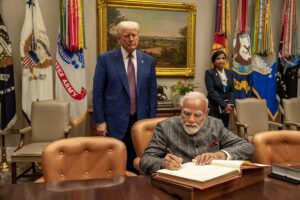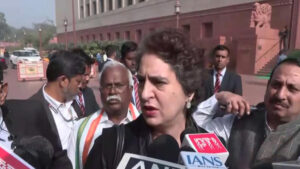Critical Minerals Are Set To Rock Geopolitical Status Quo

Lithium mining at Salar del Hombre Muerto, Argentina (Image by Coordenação-Geral de Observação da Terra via Flickr)
When China, the world’s top processor of rare earths, moved to ban the export of its rare earth extraction and separation technologies, the spotlight was thrown on the critical role these elements play in the global economy and the move towards a more sustainable future.
It also highlighted how so few nations dominate the world’s trade in these and other critical minerals.
And how global energy security could unfold as more and more countries demand these materials to power their own green industries.
Critical minerals such as nickel, cobalt and lithium together with rare earth elements like neodymium, scandium and yttrium are used in the manufacture of a wide array of electronic products and technologies.
They are also helping in the push towards decarbonisation, the use of lithium in electric vehicle batteries being one of the most visible examples.
However, global supply chains dominated by a few countries have prompted a search for new sources.
“China’s dominance in the production of critical minerals poses geopolitical and mineral security threats to Western economies, whose response is to adopt policies aimed at diversifying their supply chains,” write Dr James Boafo and Associate Professor Rochelle Spencer from Murdoch University.
“While opportunities exist for many African countries to participate in local processing activities, a major bottleneck is the lack of infrastructure and technology to enable these value addition and processing activities.
“To process and add value, there is a need to pull together capabilities, capital, skills, technical know-how and trade opportunities across multiple countries.”
With rare earth elements and critical minerals only available from a few countries, analysts say a supply crunch looms in the near future. Countries are already moving to secure supply chains.
For instance, while India seeks to tap into Australia’s huge lithium and cobalt deposits, Australian government officials are prepared to go the extra mile to make their access to critical minerals easier.
“The primary objective of the India-Australia Critical Minerals Partnership is to secure a stable supply of these essential minerals,” writes Yamini Aggarwal of Jawaharlal Nehru University.
“By collaborating, both countries aim to create a more diversified and resilient supply chain, reducing dependence on any single country.”
While some countries such as Australia, Indonesia and China enjoy the revenue boost from their critical mineral exports, others like Malaysia and India are making plans to cash in on the boom while attempting to balance the risks to the environment the mining will cause.
“It is not surprising that interest in mining activities in Malaysia, which was once famous for tin exports, has revived in line with the rise in global interest,” write Professor Tham Siew Yean and Neo Hui Yun Rebecca of the ISEAS-Yusof Ishak Institute in Singapore.
“Malaysia’s National Mineral Industry Transformation Plan 2021-2030 launched in 2021, aims to develop the national mineral industry sustainably along the entire value chain as a new source of growth for the country.
“Rare earths deposits in the country could be worth up to $US160 billion.”
Indonesia — the world’s largest nickel producer — has its work cut out for it managing its global trading strategies amid competing superpowers while addressing concerns over the environment at home.
“The global race for control over critical minerals has intensified, with major economies such as the United States, China and the European Union vying for secure supply chains,” writes Dr Nugroho Adi Sasongko of Indonesia’s National Research and Innovation Agency (BRIN).
“This competition could have far-reaching implications for Indonesia in terms of diplomatic relations, economic cooperation and export markets.
“Indonesia would benefit from … diversifying its trade partnerships. By expanding its network of buyers beyond China, Indonesia can reduce dependency and mitigate risks associated with geopolitical tensions.”
Already an established player in the global mining industry, Australia meanwhile, should think about giving China a run for its money, say Professor Susan Park and Dr Ainsley Elbra from the University of Sydney.
“Investing in the processing of critical minerals makes political sense. Ongoing tensions between the US and China continue to raise the stakes over accessing critical minerals for the energy transition,” they write.
“This has led to a turn away from unfettered free markets and a return to industrial policy through the US’s Inflation Reduction Act, the EU’s Critical Raw Materials Act and the Future Made in Australia Act.
“Economically, the issue is how to compete rather than trade with China.”





